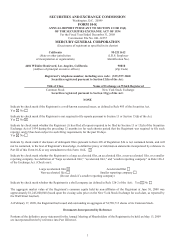Mercury Insurance 2008 Annual Report Download - page 21
Download and view the complete annual report
Please find page 21 of the 2008 Mercury Insurance annual report below. You can navigate through the pages in the report by either clicking on the pages listed below, or by using the keyword search tool below to find specific information within the annual report.11
For discussion of current regulatory matters in California, see “Regulatory and Legal Matters” in “Item 7. Management’s
Discussion and Analysis of Financial Condition and Results of Operations.”
The operations of the Company are dependent on the laws of the states in which it does business and changes in those
laws can materially affect the revenue and expenses of the Company. The Company retains its own legislative advocates in
California. The Company made financial contributions of $354,450 and $463,985 to officeholders and candidates in 2008 and
2007, respectively. The Company believes in supporting the political process and intends to continue to make such contributions
in amounts which it determines to be appropriate.
Insurance Assessments
The California Insurance Guarantee Association (“CIGA”) was created to pay claims on behalf of insolvent property and
casualty insurers. Each year, these claims are estimated by CIGA and the Company is assessed for its pro-rata share based on
prior year California premiums written in the particular line. These assessments are limited to 2% of premiums written in the
preceding year and are recouped through a mandated surcharge to policyholders the year after the assessment. The Insurance
Companies in other states are also subject to the provisions of similar insurance guaranty associations.
During 2008, the Company paid approximately $1.9 million in assessments to the New Jersey Unsatisfied Claim and
Judgment Fund and the New Jersey Property-Liability Insurance Guaranty Association for assessments relating to its personal
automobile line of business. As permitted by state law, the New Jersey assessments paid during 2008 are recoupable through a
surcharge to policyholders. During 2008, the Company continued to recoup these assessments and will continue recouping them
in 2009. It is possible that there will be additional assessments in 2009. Under GAAP, these recoverable assessments of $5.2
million have been expensed as other operating expenses in the consolidated statements of operations.
The CEA is a quasi-governmental organization that was established to provide a market for earthquake coverage to
California homeowners. The Company places all new and renewal earthquake coverage offered with its homeowners policy
through the CEA. The Company receives a small fee for placing business with the CEA, which was recorded as other income in
the consolidated statements of operations.
Upon the occurrence of a major seismic event, the CEA has the ability to assess participating companies for
losses. These assessments are made after CEA capital has been expended and are based upon each company’s participation
percentage multiplied by the amount of the total assessment. Based upon the most recent information provided by the CEA, the
Company’s maximum total exposure to CEA assessments at April 26, 2008, was approximately $74 million.
Holding Company Act
The California Companies are subject to California DOI regulation pursuant to the provisions of the California Insurance
Holding Company System Regulatory Act (the “Holding Company Act”). The California DOI may examine the affairs of each of
the California Companies at any time. The Holding Company Act requires disclosure of any material transactions among
affiliates within a Holding Company System. Certain transactions and dividends defined to be of an “extraordinary” type may not
be affected if the California DOI disapproves the transaction within 30 days after notice. Such transactions include, but are not
limited to, extraordinary dividends; management agreements, service contracts, and cost-sharing arrangements; all guarantees that
are not quantifiable; derivative transactions or series of derivative transactions; certain reinsurance transactions or modifications
thereof in which the reinsurance premium or a change in the insurer’s liabilities equals or exceeds 5 percent of the insurer’s
policyholders’ surplus as of the preceding December 31; sales, purchases, exchanges, loans and extensions of credit; and
investments, in the net aggregate, involving more than the lesser of 3% of the respective California Company’s admitted assets or
25% of statutory surplus as regards policyholders as of the preceding December 31. An extraordinary dividend is a dividend
which, together with other dividends or distributions made within the preceding 12 months, exceeds the greater of 10% of the
insurance company’s statutory policyholders’ surplus as of the preceding December 31 or the insurance company’s statutory net
income for the preceding calendar year. An insurance company is also required to notify the California DOI of any dividend after
declaration, but prior to payment. There are similar limitations imposed by other states on the Insurance Companies’ ability to
pay dividends. As of December 31, 2008, the Insurance Companies are permitted to pay, without extraordinary DOI approval,
$136.7 million in dividends, of which $115.7 million is payable from the California Companies.
The Holding Company Act also provides that the acquisition or change of “control” of a California domiciled insurance
company or of any person who controls such an insurance company cannot be consummated without the prior approval of the
California DOI. In general, a presumption of “control” arises from the ownership of voting securities and securities that are
convertible into voting securities, which in the aggregate constitute 10% or more of the voting securities of a California insurance
company or of a person that controls a California insurance company, such as Mercury General. A person seeking to acquire
“control,” directly or indirectly, of the Company must generally file with the California DOI an application for change of control
containing certain information required by statute and published regulations and provide a copy of the application to the
Company. The Holding Company Act also effectively restricts the Company from consummating certain reorganizations or
mergers without prior regulatory approval.
























